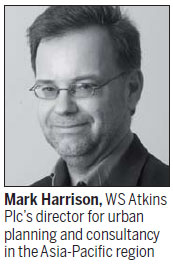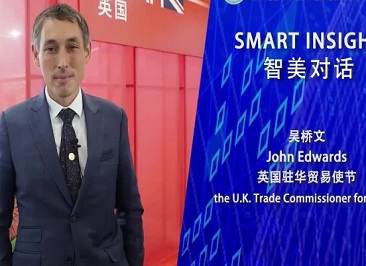Flame of passion continues to burn
Hu Haiyan, Tan Yingzi and Ji Jin
Updated:2014-08-15
China Daily Europe

Consultancy well anchored in city, and no sign of the seven-year itch
Mark Harrison visited Chongqing for the first time seven years ago, and his enthusiasm for the sprawling metropolis in western China is undiminished. For him it is "exhilarating and full of potential".
"My first impression of the city was of a vast, vibrant city," says Harrison, of WS Atkins Plc, one of the world's leading design, engineering and project management consultancy firms. "I still have the same impression today."
Chongqing is an important center for the British company to explore opportunities in western China, he says.
"Our business in the Chinese mainland is underpinned by the speed and scale of urbanization and the increasing emphasis on quality of urbanization. Chongqing and western China as a whole is an important market for us," says Harrison, Atkins' director for urban planning and consultancy in the Asia-Pacific region.
Harrison, who has 30 years' consultancy experience in Asia in urban planning and development, came to Chongqing in 2007 to set up its office there.
The city's key advantage is its location as the largest city in rapidly developing western China, and the desire to continue to grow and introduce new models of growth, he says.
Harrison says that since Atkins set up shop in Chongqing, it has continued to expand its presence in western China, and the municipality is essential in doing that.
"Cities and areas in western China are developing at different speeds. We see opportunities for brownfield site projects in well-developed cities like Chongqing. For example, we are working on a project on the Dongliang River to improve its water quality and provide landscape design to create a place for people in Chongqing to enjoy."
Atkins also sees greenfield site development projects in other less developed areas in western China, for example a new town development in Karamay, in Xinjiang Uygur autonomous region.
Like many cities in China, the challenge for Chongqing now is to increase the quality of urbanization, which entails continued economic transformation, allowing more scope for market mechanisms, creating great places to live and work, and ensuring environmentally sustainable development.
Harrison, who oversees a team of more than 200 planners throughout China and the region, has experience in large-scale master planning (new towns, CBD expansion and airport support communities); regional planning, tourism and leisure (waterfront development, resort development, sports and leisure); urban policy (urbanization, sustainable development, development intensity); infrastructure (ports, airports, roads and rail) and urban renewal.
His career highlights include strategic planning for Shanghai, working on redeveloping the former international airport in Hong Kong, and planning for the holy city of Mecca in Saudi Arabia and for Amman, the Jordanian capital.
"As China's urbanization continues apace, with the central government emphasizing quality, we see many opportunities for our business to grow by providing a holistic, multidisciplinary approach to urban development to create cities that are future proofed," Harrison says.
Atkins has had a role in many well-known projects including building the luxury hotel Burj Al Arab in the United Arab Emirates and the Olympic Park for the Games in London two years ago.
To the end of March, Atkins' underlying profit before tax was 106.4 million pounds ($178.4 million; 133 million euros), an increase of 7.3 percent over the previous year's profit of 99.2 million pounds. Its revenue rose 2.6 percent to 1.75 billion pounds.
Last year, Atkins' revenue in the Asia-Pacific region was 100.5 million pounds, 14.2 percent more than the year before. Its profit was 8 million pounds. It employed 1,498 people in the Asia-Pacific region, 15.7 percent more than the year before.
In the Asia-Pacific region, Atkins operates in a regional and sector-based business structure, so the group does not ascribe revenue to individual offices. Nevertheless, the Chongqing office has contributed signaficantly to the company's expansion in the city, and western China as a whole, Harrison says.
"In Atkins, we value the proximity to clients, which ensures there is effective and constant two-way communication to provide the best solutions to give them value. The contribution our Chongqing office makes is therefore measured and valued in a far more sophisticated manner. The understanding of the market, what our clients need, is fundamental to providing the best solutions and growing our business in the region."
Video

John Edwards, the UK trade commissioner for China, praised Chongqing over its rise as a burgeoning center in intelligent manufacturing.





